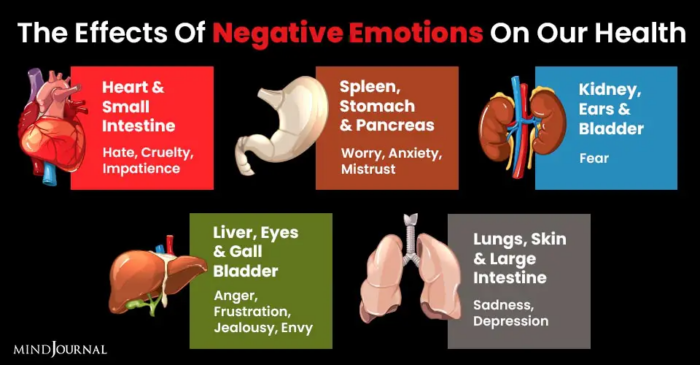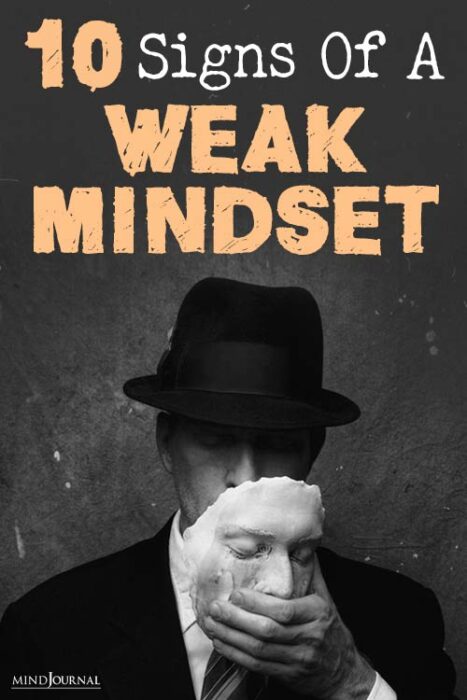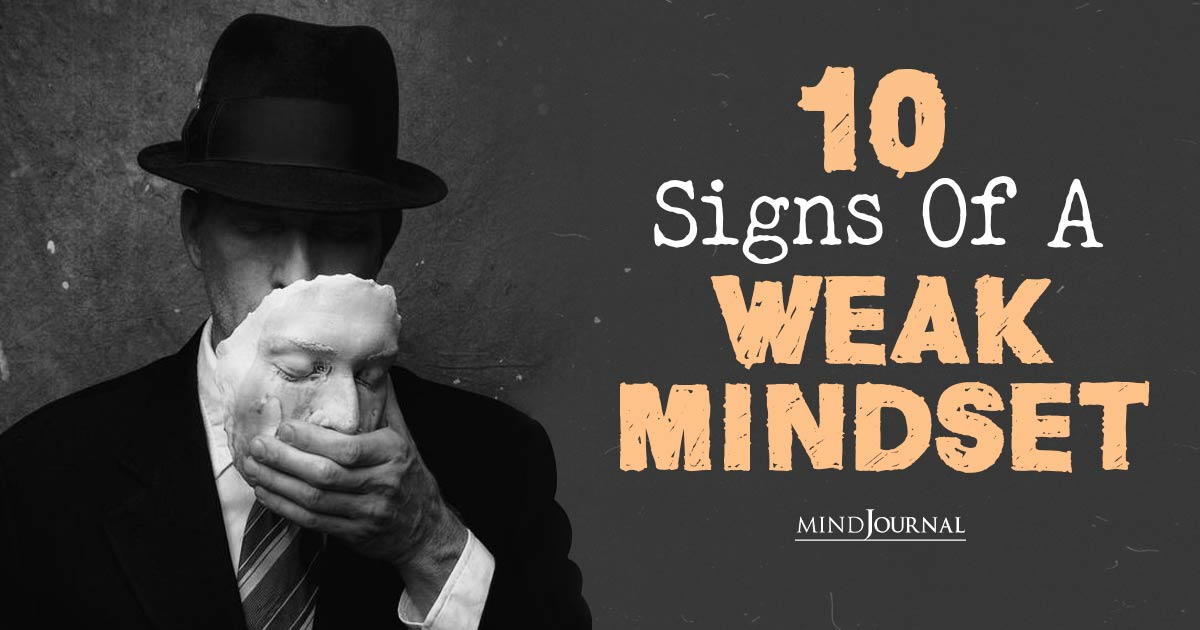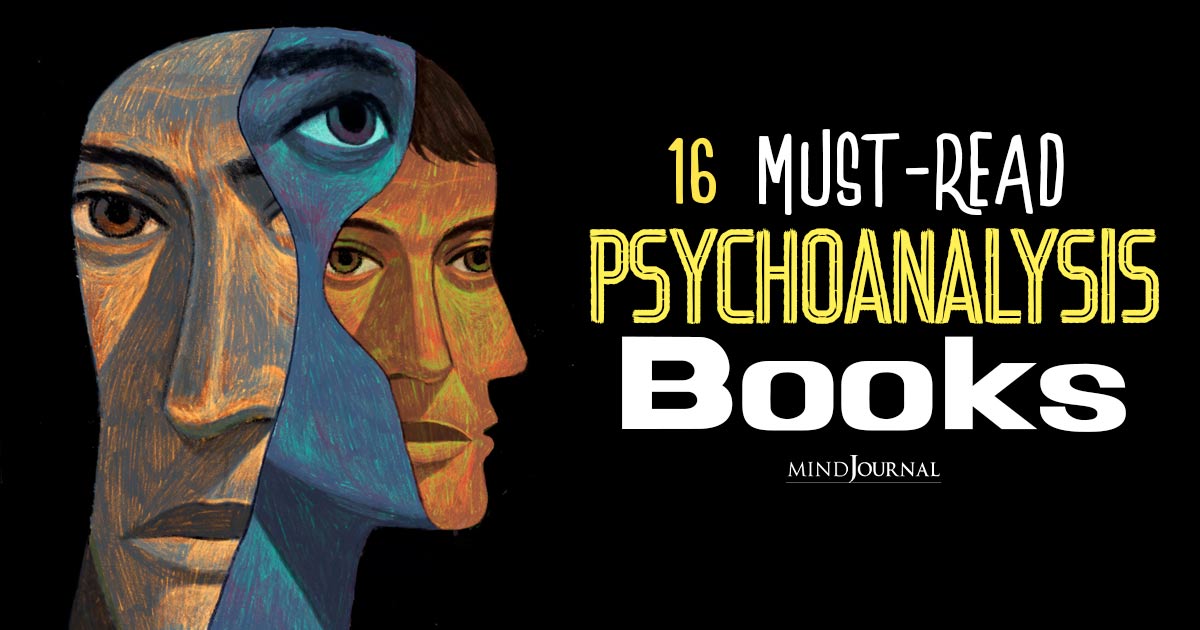What are the signs of a weak mindset that might impede your personal growth and resilience? Life resembles a grand adventure, replete with unexpected twists and turns, and the state of our minds profoundly influences how we navigate it.
A strong mindset is like having a strong shield that helps us deal with challenges. But today, let’s talk about the signs of a not-so-strong mindset.
10 Signs of A Weak Mindset
Picture your mindset as the lens through which you look at the world—a lens that can be tinted with strength or weakened by doubts. People with signs of a weak mindset have foggy and obscured perspectives and opportunities.
All the signs of a weak mindset are a clue, a doorway to understanding the areas where growth is waiting to unfold. By unraveling these signs, we embark on a journey to build resilience, absorb self-compassion, and ultimately, transform the way we navigate life’s challenges.
1. Negative Self-Talk: The Inner Doubter

Think about a time when you did something cool, like painting a picture. But then, a voice inside your head said, “This isn’t good enough.” This voice is like a mean friend that makes us feel bad about ourselves. When we pay too much attention to negative self-talk, it can make us doubt our own abilities.
Think of negative self-talk as a tiny, pessimistic roommate living inside your head rent-free, always ready to chime in when you’re feeling uncertain. One of the signs of a weak-minded person is listening to this inner critic that has a knack for pointing out your flaws, magnifying your mistakes, and casting doubt over your abilities.
2. Inflexibility: Avoiding Change
Imagine your favorite pizza place has a new kind of pizza. Most people may give it a try and actually like it. But some, like Greg, always order the same thing. Being inflexible, like Greg, means not wanting to try new things. This can stop us from growing.
One of the signs you are mentally weak is this reluctance to new experiences that often stems from a deep-seated fear of change. It’s as though we’ve convinced ourselves that the familiar portions of life are safer than the uncharted territory that change represents.
Growth rarely happens within the confines of the comfort zone. Just like a seed that must push through the earth to reach the sky, we too must stretch beyond our boundaries to reach new heights.
3. Blaming: Pointing Our Finger at Others
Meet Sarah, who didn’t finish her homework on time. Instead of saying, “I didn’t manage my time well,” she blamed her computer for being faulty. Blaming others or things for our mistakes doesn’t help us learn and get better.
Blaming is more than pointing fingers; it’s a psychological mechanism that shields us from discomfort and preserves our self-esteem. By attributing our failures or mistakes to external factors, we temporarily escape the weight of accountability.
It’s like wearing an invisible cloak that makes us feel invulnerable to judgment and is one of the signs of a weak minded person.
4. Lack of Resilience: Quitting Quickly
Picture Mia, who loves to write stories. But when one story got rejected, she got really depressed and stopped writing altogether. Having no resilience means giving up too easily. It’s like dropping out of a race just because you tripped once.
Resilience is more than just bouncing back from setbacks; it’s the art of using the setbacks as a stepping stone for growth. The signs of a weak mindset are found when the pressures of life cause a person to let go.
From a psychological perspective, resilience is closely tied to the concept of cognitive flexibility—a mental agility that enables us to adapt our thinking to changing circumstances.
5. Fear of Failure: Fear of the Unknown

Think about James, who really wants to dance but worries he won’t be perfect. This fear can keep us from trying new things. It’s like being too scared to play a new game because you might not win and exhibits signs of a weak minded person.
This hesitation, this fear of stepping into the unknown, is known as the fear of failure—an invisible weight that holds us back from taking on life’s opportunities. One of the signs of a weak minded person is the fear of failure.
This fear, often, stems from the desire for validation and the avoidance of negative emotions. Failure threatens this external validation, and the thought of disappointment is enough to stop us from even trying. The irony is that success and growth often emerge from the seeds of failure.
6. Closed-Mindedness: Not Liking New Ideas
Imagine your friend suggesting a game you’ve never played. If you always say no without trying, that’s closed-mindedness. It’s like saying you don’t like a new food without even tasting it.
Closed-mindedness isn’t just a preference for what’s familiar; it’s a fortress built around our beliefs, which cannot be penetrated by change. This is one of the signs you are mentally weak.
Closed-mindedness often stems from a desire for cognitive consistency—a need to maintain harmony between our existing beliefs and the information we encounter.
7. Constant Victim Mentality: Others Caused My Suffering

Meet Mark, who thinks everything bad happens to him. This kind of thinking makes us feel like we have no control. It’s like saying you can’t do something because the weather is bad, which are amongst the list of signs of a weak minded person.
Constant victim mentality isn’t just a fleeting feeling of helplessness; it’s a persistent narrative that colors how we view the world. One of the signs you are mentally weak is when you are wearing dark tinted glasses, metaphorically, that make everything seem gloomier and more difficult than it truly is.
Constant victim mentality often stems from the need for attention and empathy. By painting ourselves as victims, we attract the sympathy of others, reinforcing our belief that we’re indeed helpless.
Related: Weak People Revenge – Albert Einstein Quotes
8. Avoiding Challenges: New Experiences are Scary
Think of Emily, who wants to travel alone but worries too much. Avoiding challenges means not trying things that might be hard at first. It’s like not learning to ride a bike because you’re scared to fall.
Avoiding challenges isn’t just about staying in the calm water; it’s about missing out on the exhilarating adventures that can induce us to move forward.
The habit of avoiding challenges can come from a fear of failure and a strong dislike towards discomfort. It’s as though we’ve built a protective bubble around ourselves, shielding us from the unpredictable nature of challenges.
9. Impatience: Wanting Everything Right Now
Imagine starting a new hobby and wanting to be great on the first day. If you stop right then because you’re not amazing, that’s impatience. It’s like planting a seed and digging it up the next day because it hasn’t grown into a tree.
Impatience isn’t just about wanting things quickly; it’s about valuing the destination over the journey. The presence of impatience is one of the signs of a weak minded person and it makes them give up prematurely.
Impatience often stems from our desire for instant gratification. This culture of immediacy creeps into our mindset, making us view progress through a narrow lens of short-term goals.
10. Isolation: Avoiding Others
Think of Sophia, who closes herself off from friends after a breakup. Isolation is like building a wall around yourself. It might feel safe, but it can stop you from making new friends or having fun.
Isolation isn’t just about physical solitude; it’s about emotional detachment. Signs you are mentally weak involve building walls around your heart and keeping others at a distance.
Isolation often stems from a fear of vulnerability. We might believe that by keeping others at bay, we shield ourselves from potential hurt or rejection.
Related: Blocking Is For The Weak People – Breakup Quotes
Growing Toward a Stronger Mindset
These signs of a weak mindset aren’t meant to make you feel bad. They’re like little flags showing us areas where we can get better.
Imagine turning your inner doubter into a cheerleader in your head. Try new things and find exciting adventures, even though it might be scary at first. Instead of blaming others, learn from your mistakes.
The journey to a stronger mindset is like an exciting game with levels to conquer. Each step is a chance to become braver, kinder to ourselves, and more ready for whatever comes our way.
Frequently Asked Questions (FAQs) :-
How do I know I have weak mindset?
There are several signs of a weak mindset. Some of them are: lacking resilience and patience, isolating oneself, avoiding challenges, being close-minded, and having a fear of failure.
Can a weak mind become strong?
Yes, a weak mindset can be trained to become strong.
What happens to a person with a weak mindset?
A weak minded person will have to suffer constant failures and their goals often remain unrealized.









Leave a Reply
You must be logged in to post a comment.